One way to define love is "sustained, compassionate attention". These words came from John Muir Laws, a naturalist, educator, and artist who inspires stewardship of the land by sharing his practice of nature sketching. When I read these words, I began to see the importance of my own art practice in developing sustained, compassionate attention for myself.
Read moreBeing Open to Outcomes
I packed water, an apple, and an orange, but no extra layers of clothing. This was Christmas Day. A leisure ride, nothing that was going to kill me. I knew the hill on Higgins Canyon Road from having come down it once by car. Winding and barely wide enough for one car and a bike to pass. Spectacular views of Sky Moon Ranch, the sheep and cattle grazing next to large water reservoirs on steep hillsides.
The route we had chosen would not, we decided in advance, include riding up that part of the road. We would turn off and make a loop back to town, way before that steep ascent. After all, this was Christmas Day. No need to kill ourselves.
The turnoff was, according to the map, just after Burleigh Murray Ranch and off to the right. All we passed were private roads with mailboxes and No Trespassing signs on the right. We kept riding because it was a gorgeous day and it was fun.
Next thing I knew, we were headed up the hill.
I was winded, already climbing, when I began to get the words out about checking the GPS. By the time we found a safe area to pull off the road, we had already climbed several hundred feet. I was already in one of the lower gears. The winding road was laid out in front of us, one short section at a time, only revealing the very next turn, not telling us whether this was the last, or second to last, or how many there would be ahead. No tacit reassurance of “one more to go”, like a personal trainer or aerobics class instructors might provide.
Only the half loop spiraling up and disappearing behind the next bend. So in the moment of riding, there is only the decision to make it around the very next bend. Or not. There is no gratification of “knowing” that if you just do one more of these, you’ll be a rock star. Only the decision, between you and your body, whether to take the bike up one more section of the spiral.
It’s the “Do what’s in front of you” part of going toward your vision. Your bike is pointed in the direction of the top of the hill. Your job, in any given moment, is to pedal up this particular section. Your job is not to “get to the top”. Getting to the top is what happens when you make the decision to see what’s around the next bend, over and over again, and then you look up from what you're doing to discover that you’re at the top.
I remember exactly that moment from this Christmas Day ride, actually. I had just powered up about three sections without rest, after a man twice my age wearing blue jeans had passed us. He was sincere and kind when he said, “Merry Christmas! You guys are doin’ ter-RIF-fic!” I thought to myself, “Not as terrific as YOU are!” and kept pedaling because I couldn’t talk. I bore down a little harder, figuring I wasn’t going to rest my way to being in that kind of shape when I am his age (I guessed 80).
But by the end of the third spiral, I had it in my head that this was it. My limit. If the next climb didn’t bring us to the top, I would turn around. It was Christmas. Why was I killing myself?
I stopped and, panting, leaned on the handle bars of my bike, sucking down water from my CamelBak straw between breaths.
“Is this it?” my riding partner Randy asked.
I couldn’t talk just then. I was feeling the simultaneous sensation that my body was being pushed to a limit, and the sense that I wanted to feel more of this. There was a kind of curiosity and delight about seeing what a little bit more right now would feel like. Even though it was pretty uncomfortable.
So I said, “Go!”, motioning for him to start climbing the next portion. To see what was around the next bend.
I didn’t wait for my heartrate to slow down more or my breathing to recover to normal pace. I started climbing, choosing to go deeper into the “zone beyond comfort” and see where it took me. I didn’t care about the top, I just wanted to keep going and feeling this sensation.
The rhythm of my pedal strokes was slow and steady. My lungs were getting accustomed to the slight burning that accompanied each breath. It took focus ot keep the handlebars in line with the edge of the pavement as I climbed like this. I looked only directly ahead of me. Not toward the top.
And around the next bend, we saw the 80-year-old man come coasting toward us, having reached the top and turned around already. I had no focus left to smile, comment, or register this fact but had to keep pedaling. The last piece of road was a bit of straightaway and the top was marked by an old gate at the base of a eucalyptus tree, with an expanse of downward rolling hills stretched out beyond it.
We were there. The top. It wasn’t something we set out to do. In fact, I had strictly planned otherwise. It was something that happened as a result of deciding, one stretch of road at a time, to keep climbing and see what’s around the next bend.
Photo by Nancy Yu, http://yurides.wordpress.com
Learning to Ride
It’s freezing. All I know is it’s 11 miles out and back. The description on the website had said, “Participants must be in good cardiovascular condition. No single track/technical work. Climbing for sure.” I should have known when I saw the fat tires on everyone else’s bikes.
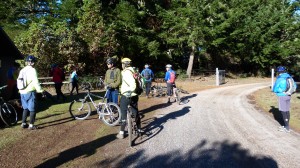
Oh, how we wish that learning would take place in the comfort of our familiar homes! A cozy blanket, a warm cup of tea, our favorite music playing, and the knowing that everything as we have chosen and arranged it now surrounds us.
Learning for me always looked like showing up in a classroom, or privately in front of a teacher, and demonstrating what I knew. I would then get feedback in the form of a critique, the next challenge chosen by the teacher, or a score on a test that told me how much what I thought I learned matched what I was expected to have learned.
What I learned on my first mountain bike ride this weekend is that learning – the fresh, raw experience of aha!wow! that’s new! – can be extremely uncomfortable. It can happen when we are placed (or we find ourselves) in a situation we did not know we chose (but we did) and that every fiber of our being is wanting to fix, alter, escape, or resist. But there we are. In my case, “there” was a guided 11-mile ride on a closed access trail. Turning back was not an option without taking the entire group with me.
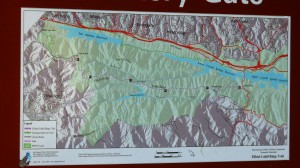
There are questions, but none worth asking, because any answer provided verbally in advance would not actually provide helpful information. I could only get answers in the act of experiencing it. How steep are the hills? How will my bike hold up? Am I dressed warmly enough? What gears should I use? Am I in good enough shape for this?
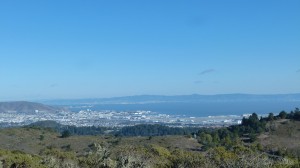
I find out the answers to each of them as I encounter the first climb, and then the first big downhill. The first of many. Each one a little longer, a little steeper. They keep coming. My lungs are burning. My ears are burning from the freezing cold air. I am miserable, I am cursing my bike for not being a “mountain” bike, only a hybrid. I excuse myself from having to keep up with the group because of this. I don’t want anyone to talk to me. I just want to breathe without the burning in my lungs.
At one point I am hurtling down a steep hill. My tires slip a little, causing me to bounce and weave, and instead of trying to take control, I decide to just let the bike do its job. I had no ability – defined as knowledge through experience – to control the bike or determine whether I would even stay on it. Slamming on (or squeezing) the brakes was not going to guarantee any safe outcome. I briefly flash back to skiing, where I’d always tried to slow myself down at the steepest parts, and it wasn’t always the best way – it was resisting the flow down the mountain, and it took a lot of effort to go against gravity.
I see now that I was lucky not to have fallen. But in that moment I had no concept of “luck” or “no luck”. It just wasn’t my day to fall. I let go, and it was my day to witness that miracle.
I keep going only because no one really asks me if I want to stop. I cycle through struggle, resistance, surrender, and then surviving.
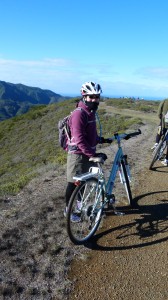
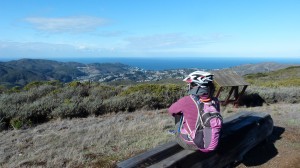
I take a rest, at the turnaround point, and just breathe. It feels good to cover my entire face and breathe normally. Now I really have no choice other than to go back along the trail the same way we came.
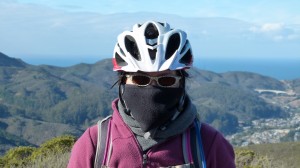
I become curious, and begin to play. That’s when the true experience of learning begins to happen.
What could I try to do differently to see if it will make my experience any different?
I stop telling myself I have the “wrong” bike and start playing with adjustments. I raise the seat up. That one small move helps a lot.
My mind so wants a binary “how to” on the gears. A set of instructions like, “When going downhill, do this….When going uphill, do that.” But it isn’t that linear. Every hill is slightly different. My ingoing speed determines which gear would match it best when coming out of the hill. I have to play. Constantly engage with what is happening in this very moment, and be open to discovering.
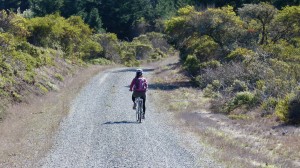
I discover an elaborate, moment-to-moment dance of body, bike, and terrain. Tweaking. Feeling. Being ever present and also facing forward, constantly moving. Listening. Discovering. Adjusting by taking small actions.
During the second half of the ride I am much more friendly with my bike, my body, and the terrain. I am much more involved as a full participant, doing my part of the three-way equation, not trying to resist or control the other elements. I am having (slightly) more fun along the way.
At the end, I feel tired but glad. My body is very grateful for the opportunity to play and be worked. Discovering new possibilities and dancing within the situation, I realized there was only the choice of the moment – to ride it or to stew in a story of misery. I chose to ride.
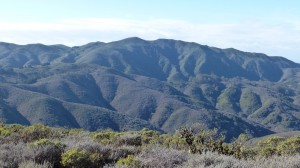
How is your relationship with Not Knowing?
"Not Knowing is most intimate..." - Zen saying
This is a note for you. You are such a good student, when there's a teacher standing in front of the class, and other students surrounding you, all learning to do the same things. You are a stellar worker, always taking responsibility for your job, above and beyond the call of duty. You take instructions quickly, correct your mistakes diligently, and do everything you can to get along with others. You are smart, capable, successful, but still feel there's something missing from your life, even though you can't quite name it.
So what is it? What is that missing thing?
I don't know.
But I'm willing to bet that your relationship with Not Knowing could use a little tune-up. A little checking in and refamiliarizing. You see, each of us was born in a state of perfect Not Knowing. The first several years of our lives were filled with the joy, awe, and wonder of discovering, playing, experimenting, failing, and doing it all over again every single moment. This is how we learned to walk, talk, and explore the world around us. There was tremendous accumulation during this time, but the overwhelming majority of space was occupied with Not Knowing, and being perfectly content with that.
Then we acquired language, and experience, and started going to school, where we learned to correct our mistakes diligently, take instructions quickly, and get along with others.
Those skills served us in advancing through lots more school, in getting a job, and then learning the ways of the business and professional worlds.
Somewhere along the way, all of that accumulation began to take up much more space than Not Knowing. In fact, we may not even remember the last time we did something for the first time.
So right now you may be wondering, "How does Not Knowing actually solve a problem I'm experiencing in my life?".
Consider how your life might be different if you reclaimed the fun of it. Not having a reason, but just doing it - you know, whatever that thing is that you've always wanted to do or try. Letting go of what experience tells you, and embracing the fresh innocence of the present moment. Better yet, just existing without judgment.
If any of these sound scary or crazy, it may just be that you've been out of practice at Not Knowing.
And how do you practice Not Knowing? Well, not by fixing it or solving it. Not by hunting for an answer, or coming up with a plan.
But by consciously being there. And watching attentively while you are there.
Last night I went to my first ever hula dancing class. I had never dreamt of hula before, but I saw a performance locally that really inspired me, and then I found out there was a community class offered right in my town.
So I showed up.
There was a lot to learn. The teacher started out slowly, showing us the basic steps, then putting a few of them together into a simple first dance. Then we newbies were sent to the back of the classroom and were told to fake our way along with the more experienced dancers as they rehearsed songs they already knew.
I got to experience myself in the moment of Not Knowing, and to see how I stayed with myself. Now I am at a point where I can see this as a precious gift. But I also know that not so long ago, this was an edge I very carefully avoided, constructing my life so that I would never be in that position of Not Knowing.
How do you react when you are put in the space of Not Knowing?
Do you ask for more information?
Do you look around for someone who looks like they know what they're doing, then copy?
Do you sit out and wait until next time, when you'll definitely know more and do better?
Do you just keep moving, doing what you can, trusting that this is exactly where you should be?
Do you compare what you can do now to what others around you are doing, trying to figure out what's wrong?
All of these are possible ways to relate to Not Knowing.
And all of these responses - if we are able to observe them in ourselves - hold the possibility to bring us closer to knowing ourselves. Closer to becoming intimate with Not Knowing. And more grateful for being exactly where we are in any given moment.
So that is the gift of any brand new experience, whether you enter it by choice, opportunity, or crisis.
In one form or another, all of my work is an opportunity for you to experience yourself in relationship with Not Knowing. I hold open the space for you to experience how you are as you navigate this unfamiliar territory.
This fall, I'm offering you an expansive yet gentle way to become more intimate with your own space of Not Knowing. It's an oceanside retreat with me and a circle of 6 participants, called "Beyond Knowing: Many Paths to the Present Moment."
We will learn from the teachers in nature - the ocean, the sky, the birds, the trees, the sand. We will also learn from approaching and entering various portals to the present moment, which is always fresh and alive with Not Knowing. We will discover what arises when we clear our attachments to thoughts, align our mind-body-soul, and allow our innate expressions to find a voice. We will create a safe space together where we can touch the space of Not Knowing, with gentleness and firmness, full participation, mutual support, no judgment, no force, and no extra.
You will take home tools that you can continue to practice in your daily life, each time you come in contact with the beauty and terror of Not Knowing. You will also take home artifacts from your unique expressions created in the setting of the circle of support provided during the retreat, reminding you of your heart's truth, and your magical reserves of resilience. You will also have the experience - carried in every cell of your body - of having become more familiar, more intimate with Not Knowing.
You can learn all the details about the retreat here.
Can you really take a day off?
[singlepic id=410 w=320 h=240 float=center] There was a time when I believed - when I was totally convinced - that I could not take a day off.
Maybe it was the example of my parents, whom I saw work tirelessly every single day, never letting go of the responsibilities of their jobs, and never taking a day off unless they were absolutely required to (and by that I mean, being so sick they had to be admitted to the hospital).
Or maybe it was medical school, where I learned by working alongside residents and fellows who would regularly show up to work sick, because they "couldn't take a day off". On one rotation, I recall the vascular surgery fellow being so rundown from flu-like symptoms that he had to dash out of the operating room to throw up in the scrub sink during a procedure he was performing. I watched wide-eyed and took everything in, my mind drawing the conclusion that "people with important jobs can never take a day off".
I became determined to find work that would enable me to take a day off, and still be considered important.
The problem was, I really had no idea what was truly important to me. I had many concepts that had been implanted by messages from my family, from images in movies and advertisements, and from the culture in which I was living. "What's important" was a moving target, a reaction to whatever "everyone else" appeared to be doing.
Meanwhile, in my heart I knew that I wanted to make a difference in this world, to care about something genuinely, and to share my story somehow in this life.
But the only way I knew - based on what I had seen, learned, and been taught - was to put my head down and work.
I worked hard at everything I did. I didn't take many days off. When I did, I remember feeling an odd combination of freedom and loss.
"Who am I without my email inbox full of requests and my voicemail full of messages?"
"Who am I when I am not answering to anyone else?"
"What would I choose to do if I had an entire day with no obligations, no one telling me where to be or what I had to do?"
Questions like these would pop up in the few instances I let myself off the hook and took a break. The questions themselves brought up feelings of fear and confusion, because no one had ever asked them of me before. I had never dared take the time to find out what the questions might reveal, if I invited them into my life.
So I pushed them away, filling my time with work instead.
It was easier than grappling with the questions.
And yet I know now, looking back, that the times when I felt the courage - the imperative - to take time away from my routine and give myself a change of place, a change of pace, and a piece of open space to allow these questions to surface, have been food for transformation in my life. Had I not followed the instinct to "Just do it", I would not have been given the chance to watch my true story unfold, and so many of my genuine desires come into reality.
These days I am often approached by people for advice on career transition, achieving happiness or fulfillment, healing from chronic medical diagnoses, and how to get "unstuck" in life.
I listen, and I am always deeply humbled by the courage required to put our struggles into words and share them with another person.
I know that, being another human being, I never have the answers for another human being. To say that I do would only feed that part of our minds with an insatiable appetite for certainty and control - the same part that tells us we can never take a day off.
The coaching or healing or help or support I provide - whichever word you choose to describe the energy of being in the presence of divine acceptance of what is - is a practice of opening space, of giving permission to ask the questions that come up (no matter how much fear accompanies them), and celebrating the miracle of the unique journey we each take in this life.
So, can you really take a day off?
I don't know the answer for you.
But if the question interests you, why not try it and see where the answer takes you?
Here's an opportunity to join me and my friend Mary Bartnikowski - photographer, author, kundalini yoga instructor, and world traveler - for a May Day ReTREAT at the beach in Half Moon Bay: Spring Cleaning For Your Soul
Be Careful What You Wish For...
Last year I made a vision board for who I am and how I feel when I express my creativity. I had devoted 2010 to my Core of Peace, and I was setting a new intention for 2011. I didn't know exactly HOW my creativity would be expressed. But by making the vision board I connected with images and words that captured how I knew it would FEEL to be in that place of expression.
I let go of the HOW, because I didn't - and couldn't - know at the time what the exact steps would be.
I breathed deeply into the feelings of my own creativity, and allowed images to attract me without needing an explanation or a meaning or a concept. They were just images that I loved, for no "reason" at all.
Here is the vision board I made:
[singlepic id=369 w=320 h=240 float=center]
I have it as the wallpaper image on my laptop, so every time I open my computer, the images enter my consciousness. Most days, I don't sit and deliberately stare at every image on my screen, but I know they are there.
I haven't thought about that vision board in many months. I have gone about the business of living, of staying in my Core of Peace, of letting some things go, and picking up other things, of planting seeds and watching them grow, all the while noticing that I cannot force growth to happen any faster than it already is.
Last night I looked at it again.
It was with a sense of amazement that I noticed how many of the images had actually come into my reality during 2011. In other words, my visions had come true!
While I was holding the intention to express more of my creativity in 2011, I lived by the mantra, "First Feel Free." The actions that resulted from that feeling included walking away from a commercial lease, and six months after that, downsizing my belongings by about eighty percent and moving out of my two-bedroom, two-bathroom apartment, and into my boyfriend's two-bedroom, one-bathroom house, with a kitty and a big backyard.
We started a vegetable garden.
[singlepic id=473 w=320 h=240 float=center]
We climbed to the top of Half Dome in Yosemite, after months of training with progressively longer hikes every weekend.
[singlepic id=457 w=320 h=240 float=center]
I fell in love with the outdoors, and discovered a new interest (er, obsession) in backpacking.
[singlepic id=471 w=320 h=240 float=center]
I also fell in love with spoken word, and began accompanying poets with live violin improvisation during their readings.
I accompanied a dear friend on violin while she sang her heart out in a burlesque show, observing the self-empowerment potential for women to love (and even flaunt) their own bodies exactly as they are.
Our band, Chinese Melodrama, stumbled into a new niche combining our love of supporting local businesses and the taste of wine, by providing music at local winery and wine bar events.
I got so busy living that my writing and videoblogging could no longer keep pace with the rate at which I was accumulating experiences. I let go of my need to report on every single learning and observation I had about the world, and began to just fully soak in the experience.
Meanwhile, another dream came true, with the opening of a brand new yoga and healing arts studio just a few blocks away from my new home. It was also another example of letting go of my grief over "not having a yoga studio anymore" and allowing the magic of life to arrive at my doorstep. I now find myself on the roster of musicians for the Sunday evening yoga and healing sound classes (starting in September, I'll be playing the second Sunday of every month), and working with the studio to coordinate events with my community of healing artists, musicians, and poets.
[singlepic id=470 w=320 h=240 float=center]
Looking back at my vision board, I can count the images that have arrived in my reality since that day last year. I have found myself in the woods, on the top of mountains, at the rocky shores of the ocean, standing in awe of a sunset, opening my arms to the expansiveness of the sky, praising the stillness of the forest, celebrating my own beauty, and playfulness, and togetherness with a companion.
[singlepic id=452 w=320 h=240 float=center]
All of this, once just a vision, is now my reality. All of this is who I am and how I feel when I express my creativity, letting go of the HOW and opening to the expansive mysteries of the earth and life.
The old saying goes, "Be careful what you wish for."
I say, "Be bold about what you wish for."
And brace yourself. Because you just may get it.
Tiger Mother Amy Chua Sets the Record Straight
[singlepic id=449 w=320 h=240 float=center] So, for those of you who still haven't read the whole book, and may even find yourself getting sick and tired of all the "Tiger Mom" and "Tiger Cub" stuff being thrown around the web, here's something that might ease your suffering. Amy Chua wrote a column in USA TODAY entitled, "Here's how to reshape U.S. education."
First of all, it's short and very readable in a few minutes, honoring our short American attention spans, a la USA Today.
Second of all, Amy "follows the rules" and wears her academic hat here, citing historical geopolitical examples, statistics, and all those other techniques that make our rational brains feel taken care of. She sounds smart, succinct, and very put-together. To draw a wardrobe analogy, she would be wearing a navy blue suit and high heels in this article, while in Battle Hymn of the Tiger Mother we saw her with no makeup, maybe some running shoes, and her "fat jeans". In other words, she wasn't so pretty and polished.
Here, she only briefly hints at her own vulnerability, her own flawed human condition, by stating that she "learned her lesson the hard way" when her younger daughter (NB: the daughter who does not yet have a blog, and has not yet gotten into Harvard...she's only a freshman in high school) rebelled. She also hints at the vulnerabilities of her attackers - you know, the parenting bloggers and other self-righteous jumpers-on-the-bandwagon who feel the need to polarize every story into a right-versus-wrong debate - by saying this about parenting in particular, and why it's such a hot-button issue:
"We all desperately want to get it right and never know for sure whether we are. Perhaps it's because the stakes are so high, and it's terrifying to admit a mistake."
Ultimately, in the final paragraphs, she boils down her point of view into a very tidy philosophical statement of "East Meets West", imagining an ideal borrowing from the "best of both worlds" - the structure and discipline required in early childhood to establish a foundation of learning, and a gradual opening in the later teenage years to allow ample exploration of individuality and creative self-expression:
The great virtue of America's system is that our kids learn to be leaders, to question authority, to think creatively. But there's one critical skill where our kids lag behind: learning how to learn.
East meets West
If in their early years we teach our children a strong work ethic, perseverance and the value of delayed gratification, they will be much better positioned to be self-motivated and self-reliant when they become young adults. This is a way to combine East and West: more structure when our children are little (and will still listen to us), followed by increasing self-direction in their teenage years.
When I read these words, they sound familiar. I agree with them.
They were the ingredients I intended to bring into fruition when I started a violin school for toddlers in Silicon Valley back in 2004. With starry eyes and the willingness to put everything on the line (including a partner-level job in venture capital) for the creation of this dream, I set out to provide the ultimate combination of Eastern and Western philosophies. This was to be "more than violin lessons". It was to be "lifelong learning", using the vehicle of violin to teach discipline, teamwork, leadership, collaboration, listening, sensitivity, confidence, and mastery. Everything I could think of could be taught through the journey of learning to play violin and performing around the world.
I actually used the term "learning how to learn" in my parent seminars and recruiting presentations.
And I did attempt to teach people - parents mostly - how to practice. I designed "practice charts", created videos, held evening seminars complete with PowerPoint presentations, hosted summer camps with guest teachers, invited high school seniors as "examples of success" other than myself, traveled with entire families (our peak was 76 travelers and two full-size motorcoaches) from California to Chicago each year to perform at Orchestra Hall.
By trying to put Amy Chua's eloquent words into real-life practice with real-life people, I realized that no one person, no one system, can "make" anyone learn. People learn exactly what they learn, when they learn it. When they are ready to receive a particular lesson, they do. No sooner and no later.
Amy Chua's lessons came to her when her younger daughter was a pre-teenager, when everything fell apart in her tightly controlled, perfectly planned world.
My lessons came when I realized that I could not create THE perfect learning environment for every child, no matter how carefully I honed my interviewing, recruiting and selection process (designed to screen for parents who knew how to learn), or how much energy I poured into the individual dynamics of each child-parent-family system.
I could not teach anyone "how to practice" if they were unwilling or unable to go through the messy learning process on their own, make mistakes and admit to them, ask for help, try things and fail, and be willing to let go of attachment to outcomes. Including myself. In the end, the greatest lesson I learned was exactly how unwilling I was to be open to the outcome that my school would be imperfect, that it might not match up to the expectations and image I had created in my mind for what I would be able to achieve.
And so I gave up. I let it go. I quit. I had given all I could give, based on who I was at the time.
And now, more than a year after letting go, I am saying my first words about it in public, with some level of honesty and self-compassion.
Amy Chua talks about the "perfect" education system as combining lots of structure and discipline in the early years - when the children still listen to their parents - followed by opening and letting go in the teenage years. The challenge I found, when trying to put this into practice with real people, is that the "Eastern" parents couldn't trust the process enough to let go and watch their children learn from harmless mistakes, and the "Western" parents wanted to allow teenage-like behavior to blossom at age seven or eight.
I was at a loss for words, or programs, or activities, to address the diversity and complexity of issues that were playing out in front of me. Everyone seemed to need a different message, a different balance, and yet when the kids were put in front of the parents as a group, no one could stop themselves from comparing and despairing. The insecurities kicked in. The measurement of progress relative to other kids. The need for recognition in terms of trophies and plaques. In other words, all the things that kill learning and stop creativity in its tracks.
Since I had taken it upon myself to try to create one learning environment - one culture - that would meet the needs of every single student, parent, and family, I failed. I failed at an impossible task.
Worst of all, I was alone. I had created no community of support in terms of other practitioners who were "on the same page" as educators, facing the same challenges. I found a non-profit organization, called "Positive Coaching Alliance", that was doing parent and coach education in the arena of sports as personal development. I sponsored a workshop by their organization for the parents in my school, hoping to draw out the many comparisons between sports and music in their children's education.
But it was too late. I was stretched thin in terms of my energy, I was entangled very deeply in some toxic and manipulative relationships with a few very vocal parents in my school, and I had no one to confide in, except my own journals and blogs. I had no outlet for discussion of the harsh truths, the difficult emotions, the tenderness of the situations I was dealing with, the courage I was being asked to call upon - which I could not find.
The advice I got from my own teacher amounted to this: "Well, you just deal with it. That's the way it is. You've got no choice. This is what you've gotten yourself into. And your parents are ten times better than the ones I've dealt with my entire forty-year career, so be thankful."
It didn't feel helpful, and I couldn't find the feeling of "thankfulness", no matter how much I believed I "should" be thankful.
I didn't want to look forward to another x number of decades in this state of unrest, grappling for control, and feeling so responsible for the outcomes of so many lives (yes, I really did think I could make that big of an impact through violin). I knew firsthand - from my own childhood experience - the many toxic emotions that could be cultivated in a violin school, how comparisons, competitions, and insecurities could bring out the ugliness in even the most well-intentioned people. And I did not want to repeat that experiment.
I wanted to part of a solution, not part of a problem.
So I stopped.
My solution was to get to know myself better, to dive into my own vulnerabilities, to explore what was possible for myself when I allowed my own creativity to flow, and to really learn for myself what peace, joy, and freedom felt like. My solution also involved learning to see my own responsibility for creating the situation I found myself in, facing the painful truth that my thoughts and beliefs drove me to act in ways that caused my own suffering.
Reading Amy Chua's seemingly definitive answer for "how to" reform education in U.S., and seeing the many readers who, only now, are willing to acknowledge her wisdom, I'm reminded of our collective discomfort with the unknown, and our voracious appetite for certainty.
Now that I am at some distance from my career as a violin teacher, I feel less certain of what I would say to a parent about "how to" do that formidable job - the one where the stakes seem to be so high, where we seem to be so afraid of "doing it wrong". I feel less attached to sounding put-together and having pat answers to complex questions.
But I also feel more trusting of the process of life. I feel less afraid of other people's (and my own) reactions in the face of uncertainty. I feel more compassionate toward the pain and fear of looking our own vulnerabilities in the face.
Why? Not because I went to Harvard. Not because I made partner in a VC firm. Not because I "followed my dream", and built a business. Not because I now call myself a "life coach".
But because I'm committed to learning. To the complex, sometimes messy, sometimes difficult, sometimes ugly, and ultimately rewarding process of learning.
I'm now discovering, in small steps each day, what it's like to live life for the joy in each moment. I'm walking the talk. For me. I'm making my own mistakes, learning my own lessons, and loving myself more every day.
And that's the perfect education for me.


